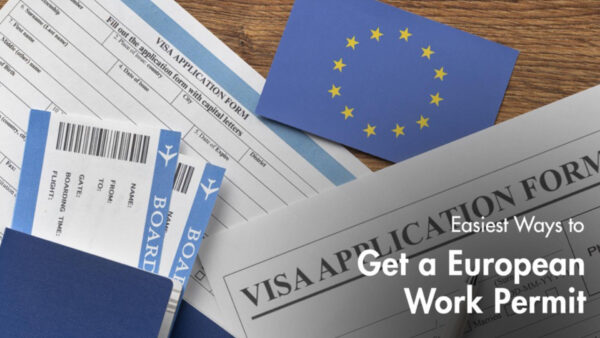
Europe Work Permit & Visa Eligibility Requirements
With thousands of years of history and legacy, Europe is a rich continent. In addition to having a rich past, Europe has also been able to develop its economy. Numerous conflicts have profited from revolutions. The Second World War was the most shocking event. There were no more barriers in Europe after that. The majority of contemporary technology, beginning with the agricultural and industrial revolutions, was developed in Europe, taking into account the economic wheel dynamics. Europe is another label for the developed globe because of this. How to Obtain Permanent EU Citizenship and EU Citizenship.

Professionals looking for work abroad continue to choose Europe as their preferred destination. It is hardly surprising that many people want to work in European nations given their thriving economies, diversified cultures, and excellent standard of living. However, to ensure a seamless application procedure, it is essential to comprehend the qualifying requirements for work permits and visas. Immigration Everything you need to know about work permits and visas in Europe is covered in detail in this book.
Europe Work Permit & Visa Eligibility Requirements

Why Work in Europe?
Europe offers countless benefits for foreign workers, including:
High-paying jobs: Competitive incomes are available in several European nations.
Opportunities for professional advancement: thriving sectors such as technology, healthcare, engineering, and finance provide a wide range of job options.
Work-life balance: European countries are renowned for their employee-friendly regulations, paid vacations, and shortened workweeks.
Cultural diversity: You can encounter a variety of cultures, languages, and customs while you live and work in Europe.
You May Also Apply For USA DV Lottery program 2025
European Work Visa Types
While each European countries has unique requirements for work visas, most of them fall into one of the following general categories:
Short-term Work Visas: Usually valid for less than a year, these visas are intended for seasonal work, internships, and temporary employment.
Long-term Work Visas: For jobs that last longer than a year. The EU Blue Card is a simplified work permit for highly qualified professionals that is accepted in several EU member states.
Employees moving to a European branch of their present company are eligible for an intra-company transfer visa. Freelance Visas: For independent contractors or self-employed people looking to work in Europe.
Visas for job seekers: Permit people to enter the nation and look for work for a predetermined amount of time.
Apply Canada work permit visa
General Eligibility Requirements
While each country has specific conditions, the following are common eligibility criteria across Europe:
European Work Visa Types
A legitimate job offer from a European employer is a prerequisite for the majority of work visas.
It might be necessary for employers to prove that there is not a local candidate for the job.
Educational Requirements: It is frequently necessary to have a degree or certification related to the position.
Advanced credentials could be necessary for highly specialized positions like engineers or IT specialists.
Work Experience: Your eligibility is increased if you have relevant work experience.
A minimum number of years of experience may be required for certain visas.
Language Proficiency: For many positions, knowing the local tongue or English is necessary.
For English proficiency, certifications like the TOEFL or IELTS may be necessary.
Adequate Financial Resources: Evidence of your ability to sustain yourself for the duration of your stay.
Requests are frequently made for bank statements or financial guarantees from sponsors.
Health Insurance: The majority of European work permits need comprehensive health insurance coverage.
Clean Criminal Record: To make sure you have no criminal history, a background check may be performed.
Particular Requirements for Specific Professions: Certain occupations, including healthcare, may call for extra certificates or licenses.
How to Apply for a European Work Visa
The following steps are often involved in the procedure, however they differ significantly by country:
Obtain an employment contract or offer letter from a European firm in order to secure a job offer.
Verify the type of visa: Choose a visa based on the length of your job.
Collect the necessary paperwork:
Documents that are frequently needed include: A valid passport and a letter of employment offer Certificates of education Evidence of financial resources Health coverage Certificates of competency in the language

Conclusion
Securing a work permit and visa for Europe may seem complex, but with proper preparation and understanding of the requirements, the process becomes manageable. Whether you’re a skilled professional seeking an EU Blue Card, a freelancer exploring opportunities, or a job seeker planning your next move, Europe offers endless possibilities. Start planning today to turn your European career aspirations into reality.
Our Website: ChakrirPatrika.com